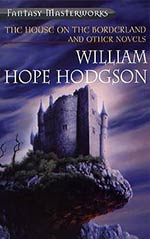
![]() charlesdee
charlesdee
2/1/2015
![]()
I am sucker for this kind of set up. William Hope Hodgson claims to have received the manuscript in 1907. The manuscript recounts a fishing trip taken by two men in the western part of Ireland in 1877. On the trip they discover the ruins of a great house in the spectacular setting of a promontory overlooking a chasm fed by a thunderous waterfall. Other than a few piles of masonry, the only thing they find is a diary, preserved beneath a mound of rubble. How has this diary survived the decades, possibly the century, since the house collapsed? If you get hung up on such questions, you are reading the wrong book.
The bulk of the novel is the transcription of the diary. A middle-aged man lives with his sister and his dog in this remote location. He requires solitude for his studies - whatever they are - and to grieve over the loss of the great love of his life. He never writes this, but the reader picks up the clues. One night he dreams that he leaves earth for another dimension where he finds a gigantic version of his house built of jade and surrounded by mountain ranges inhabited by all the gods and demons of world mythology. On the Plain of Forgetfulness he has a vision of his lost love. He also sees swarms of swine-headed creatures, which unfortunately seem to follow him back to his waking life.
For many pages, the narrator wages a battle against these creatures. He tells this part of the story in exciting, precise prose. With the battle apparently won, he settles back to an uneasy existence, only to be transported once again outside of time. From here the story takes off in cosmic directions that tend to lose readers who have come for the monsters but earn the book its standing as early science fiction. Or fantasy, depending upon how you read it.
What the book really is, is weird as all get out. Even after this second trip outside of time, the story continues until it reaches a dark, pessimistic conclusion. Or at least I think it does. Hodgson, posing as editor, has this to say
The inner story must be uncovered, personally, by each reader, according to ability and desire. And even should any fail to see, as now I see, the shadowed picture and conception of that to which one may well give the accepted titles of Heaven and Hell; yet can I promise certain thrills, merely taking the story as a story.
http://www.potatoweather.blogspot.com